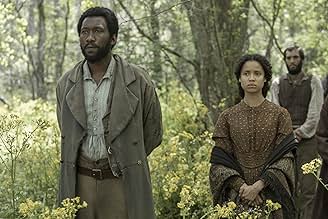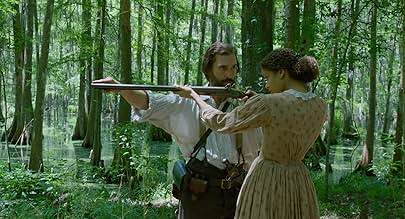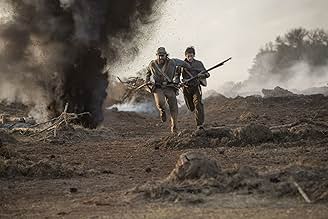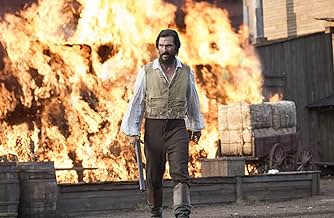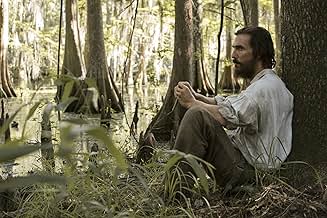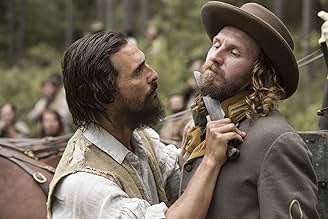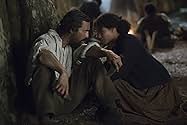Un desilusionado desertor del ejército confederado regresa a Mississippi y lidera una milicia compuesta de otros desertores y mujeres en un levantamiento contra el corrupto gobierno confeder... Leer todoUn desilusionado desertor del ejército confederado regresa a Mississippi y lidera una milicia compuesta de otros desertores y mujeres en un levantamiento contra el corrupto gobierno confederado local.Un desilusionado desertor del ejército confederado regresa a Mississippi y lidera una milicia compuesta de otros desertores y mujeres en un levantamiento contra el corrupto gobierno confederado local.
- Dirección
- Guionistas
- Elenco
- Premios
- 3 premios ganados y 4 nominaciones en total
- Annie
- (as Jessica Collins)
- Wilson
- (as Donald Watkins)
Opiniones destacadas
The phrase "rich man's war,poor man's fight" never had more meaning than in the situation Knight finds himself in. He just walks away from the Confederate army and before long he's heading a movement back home seceding from the seceding Confederacy. Jones County opts for its own independence.
As played by Matthew McConaughey we see Knight certainly a person of humble circumstances who like Abraham Lincoln is a man who recognizes some great moral issues. McConaughey is humble and modest, but overwhelming in his portrayal. This film might get him a trip to the Oscars.
The two women in his life wife Keri Russell and Gugu Mbatha-Raw, the former slave who develops a relationship with McConaughey are also quite moving in their portrayal. Interracial relationships put McConaughey way ahead of his time. There is a modern story of one of his descendants unable to marry because of Mississippi's miscegenation laws post World War II. I'm not sure it was necessary for this film it kind of interrupted the flow of the main plot. In any event it probably deserved its own film.
Down the cast list there is a very moving performance by young Jacob Lofland in the beginning of the film as a young Confederate soldier who with McConaughey also realizes what business has he in a fight to protect some plantation owner's right to have slaves. You won't forget it if you see Free State Of Jones.
And you should see it.
The movie starts pretty much like any Civil War movie with battles, death and bloody bodies, but it progresses past that to the point where some people rebel against the Confederacy for the atrocities they commit against the southern farmers. The story is well told with some actual dates and facts flashed on the screen from time to time which sort of gives it the feel of a documentary. It helps keep things in perspective without being intrusive.
If I had anything to complain about, it would be then length and scope of the film. The movie ran about 2-1/2 hours. At about 2 hours, I thought it was over but then it moved into the Klan, voting intimidation and general mistreatment of the freed slaves as well as having a 100 year tie in to future generation. It was as if they tried to jam these events in to make it more politically acceptable to Hollywood. I just felt that they went beyond what the movie was actually to be about.
My father grew up in Soso, Mississippi. My mother passed away in January of this year. So when the movie came out, and he said he thought he would like to see it, I offered to go with him. He liked that, so today, on my parents 62nd wedding anniversary, which we did not mention, but I am certain was on his mind as much as mine, we went.
The Movies of Lake Worth is in a little strip shopping center out near the Florida Turnpike. It was nice that I could pull up near the curb and let my 84 year old father out with his walker. Nicer still that the walk to the theater where it was showing was the first door inside. The rows were spacious so he could even push the walker in front of him, and we sat.
My father has often talked about the Knight N___gs, of course being an old white man from Mississippi, he uses the word. Funny thing, he doesn't use the "N-word" in conversation, but i guess because the community held the Knights in a "Special" place, this was the title he knows to call them by. He recently told me that his mother, born in 1910 was picking black berries or strawberries and she and her family stopped at the Knight house to get water. That was apparently the only time anyone in his family had anything to do with the Knights.
The movie does a good job of not sugar coating anything, from the battlefield scenes to the trial for interracial marriage (shades of the gay marriage struggle in Mississippi today), to the killings of both white and black folks. The saddest part of the story is how a handful of runaway slaves helped Newton and then many more whites, but in all too common southern white fashion, the white folks, when the war was over and the deserters were safe, they turned on the blacks, even the ones who had saved their lives.
I know the British, the Belgians, the Germans, and 100 other countries, including the US Army has been guilty of equally disappointing human behavior, but this is a story about my people. Some of the people on both sides of the story are probably my ancestors. I know some fought in the Civil War, as confederates. Some probably hid out in the swamp and then betrayed those who helped them when it was time to bring Mississippi out of the dark.
The movie doesn't shy away, it doesn't spare anybody. There are two things I wonder about though.
Knight comes off as being nearly a saint. Maybe he was. Really, with the exception of Rachel and Moses, the Black folks don't have a lot of leadership. Again, maybe because of the times, they didn't, maybe it was understood the being Black and "uppity" was a good way to get killed. I just wonder if it was as much the brave smart white Newt, or if he took a bit of opportunity. Or, more likely, Hollywood has a big bankable white male star and they wanted to give him even more glory than the story had.
I don't know. The whole Free State of Jones is a history so hard to find much truth in. In fact, Mississippi is a place to find much truth in. It is my birth state, but I find more heartache than joy in it. I enjoyed the time with my dad, and it was interesting to see some kind of truth about a bizarre piece of history we have a tangential connection to.
My father's only comment was, "Some people say it was so bad back than, but it was." I think he is right about that.
I was disappointed the theater 100% white people, and with the exception of a 20 something young man and woman who could have been his young mother or older girlfriend, everybody was closer to my dad's age than even my 56 years.
If you are interested in an unvarnished view of parts of American history that you may not know much about, go see the movie. It was well done. It might even be close to the truth.
It may also be a little too quiet and slow moving for some, but the depth to which the film explores obscure American Civil War facts and events, both during and after, makes one curiouser and curiouser to see where it goes.
This is a rare film that you can watch a trailer of, or not, and not have it ruin the film. In fact, it would be very difficult to anyone to write a spoiler for this. It's also something you want to watch from beginning to end, or at least until the credits shift to white text on black. It may not be the ideal theater film, but it definitely is worthy of a hard copy for your book/DVD shelf.
In the early Civil War battle scenes, he plays a nurse. Knight is not shown mowing down the enemy with impressive, explosive gunfire. Rather, he is shown risking enemy fire in order to save men's lives, or to retrieve and bury the corpse of a boy shot in battle on his first day. My tears flowed freely during these scenes. Later, Knight himself cries after one of his men is hanged. But Knight gets his revenge, an eye-for-an-eye revenge scene that I won't soon forget.
Newton Knight was a white Mississippi farmer. He was the grandson of a slaveholder, but Knight owned no slaves himself. He served in the Confederate army, but deserted in 1862, after serving for almost a year. He was outraged by the Twenty Negro Law, that allowed families who owned twenty slaves to exempt one family member from service for every twenty slaves they owned.
Knight and other deserters formed The Free State of Jones, declaring their loyalty to the Union, and flying the stars and stripes rather than the stars and bars. After the war, Knight worked for Reconstruction and married Rachel, a freed slave woman. His children also married cross-racially. He died in 1922. As might be expected, he is a controversial figure in Mississippi. Fans of the Confederacy denounce him as a traitor. Others celebrate him as one white Southerner who had a conscience and resisted white supremacy.
Newt Knight was clearly someone with a bucketload of charisma. His power inspired men to fight to the death against their own nation. McConaughey radiates charisma in this role. He is masterful and yet intimate. I'd follow this Newt Knight into battle and feel proud to do so.
"Free State of Jones" is receiving negative reviews. It's easy to see why. There is something in this film to anger multiple grievance mongers.
First, race hustlers will hate this movie. Race hustlers want the official story to be that all whites are supremacists and all blacks are heroic. A film that depicts a white man who worked for black rights is taboo. Race hustlers anathematized "Mississippi Burning" and "The Help" for the same reason. Such a shame that the race hustlers' ideological blindfolds make it impossible for them to appreciate great art.
Liberals might hate this film for a couple of other reasons. I don't know if I've seen a movie where almost every scene hinges on how guns are used. Almost everyone is armed, and uses those weapons to keep breathing and to settle disputes. Even little girls have guns and use them heroically. Second amendment fans may love this film. It depicts what they dream of: oppressed citizenry taking up arms to defeat their own government.
In addition to clinging to their guns, these rebels cling to their God and their Bibles. This is one of the most religious American films I've seen in a while. It's an historical fact that Newt Knight was a devoutly religious Primitive Baptist – he didn't drink, for example. The film drives home Knight's Christianity. He is shown in a long scene using a quill to record a birth in his Bible. In one heartbreaking scene, a slave who has been sexually molested survives psychologically by reciting verses from Genesis. "Free State of Jones" practices a muscular Christianity. One eye-for-an-eye scene takes place in a church.
Republicans will be torn about "Free State of Jones." On the one hand, Knight, like many populist leaders, preaches against economic inequality. "No man should be poor just so that someone else can be rich." I can hear theater seats squeak as Republicans head for the exits. Knight's words, though, reflect the facts. Poor white Southerners were sabotaged by the slave economy and they knew it. That's why they deserted.
But Republicans, if they sit through the entire film, will see how the Republican Party was the favored choice of freed slaves in the post-Civil-War era.
There is a narrative problem in the film. The viewer expects "Free State of Jones" to end after the Civil War. I actually began tying my sneakers, readying to leave the theater. But the film keeps going in what feels like an anti-climax. Gary Ross, the filmmaker, wants to make a point: the Civil War was *not* the happy ending. The KKK rose up, and Jim Crow became entrenched. Black men who tried to exercise their right to vote were lynched. This is an important point, but the film should have been better structured so its narrative flow didn't stop before the film itself did.
"Free State of Jones" was clearly made by sticklers for authenticity. Everyone looks dirty and tired. The clothes look like clothes people wore in the nineteenth century. A confederate officer's uniform looks baggy and tacky, not sparkling and admirable. Scenes are shot in lamplight. I loved this aspect of the film, as will Civil War re-enactors.
¿Sabías que…?
- TriviaIn 2016 a document was discovered in the National Archives which was a request by Newton Knight's company to join the Union Army in 1864. It lends validity to Knight's claims.
- ErroresWhen the plantation owner comes back home after the war and walks through the front door, a thermostat is visible on the wall to his left.
- Citas
Newton Knight: From this day forward we declare the land north of Pascagoula Swamp, south of enterprise and east to the Pearl River to the Alabama border, to be a Free State of Jones. And as such we do hereby proclaim and affirm the following principles. Number one, no man ought to stay poor so another man can get rich. Number two, no man ought to tell another man what you got to live for or what he's got to die for. Number three, what you put in the ground is yours to tend and harvest and there ain't no man ought to be able to take that away from you. Number four, every man is a man. If you walk on two legs, you're a man. It's as simple as that.
- ConexionesFeatured in The History of Jones County (2016)
- Bandas sonorasBeautiful Dreamer
Written by Stephen Foster
Selecciones populares
- How long is Free State of Jones?Con tecnología de Alexa
Detalles
- Fecha de lanzamiento
- Países de origen
- Sitios oficiales
- Idioma
- También se conoce como
- Free State of Jones
- Locaciones de filmación
- Productoras
- Ver más créditos de la compañía en IMDbPro
Taquilla
- Presupuesto
- USD 50,000,000 (estimado)
- Total en EE. UU. y Canadá
- USD 20,810,036
- Fin de semana de estreno en EE. UU. y Canadá
- USD 7,572,206
- 26 jun 2016
- Total a nivel mundial
- USD 25,035,950
- Tiempo de ejecución
- 2h 19min(139 min)
- Color
- Relación de aspecto
- 1.85 : 1







